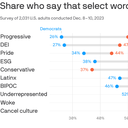Companies rush to define DEI

Corporate diversity, equity and inclusion (DEI) efforts are under even more scrutiny in 2024.
Why it matters: Corporate DEI strategies will continue, but boasting about them will not.
Driving the news: Billionaires like Elon Musk, Bill Ackman and Chip Wilson have created a lot of noise by publicly debating the merits and legality of DEI initiatives.
- This paired with the recent Supreme Court decision about affirmative action at universities have corporate communicators, human resource professionals and in-house counsel working to better define and explain their inclusion practices.
Be smart: The terms affirmative action and DEI have been conflated, says Valerie Capers Workman, chief legal officer for recruiting platform Handshake.
- "Those who practice DEI need to clearly explain what it is and what it is not," says Workman. "It is not about preference or prioritizing one group over another" like affirmative action for groups that have been historically discriminated against.
- "It's about ensuring that the best candidates are found. … Talent is everywhere. Excellence is everywhere. But access to opportunity is not equal, which means you have to widen the search."
State of play: According to a recent study by The Harris Poll, a vast majority of adults (81%) believe that corporate America should reflect the diversity of the nation.
- Meanwhile, young job seekers are still motivated by corporate diversity and inclusion efforts, with 50% of college students seeking out companies that prioritize and practice DEI and 77% preferring companies that have a diverse leadership team, per a Handshake study.
- Plus, chief human resource officers do not plan to scale back their DEI strategies, according to a recent survey conducted by the Conference Board.
Instead, they are reframing how these strategies are marketed — similar to how companies are pivoting away from phrases like "ESG" and "sustainability" in favor of terms like "impact."
By the numbers: According to The Harris Poll, roughly half of Republican voters view the term "DEI" as divisive, while only 27% of Democrats agree.
- A majority of Republicans polled also believe terms like "BIPOC," "LatinX" and "ESG" create more division.
- Voters from across the aisle find terms like "cancel culture," "woke" and "underrepresented" to be alienating.
Zoom in: This linguistic disconnect also transcends generations, according to The Harris Poll.
- 75% of baby boomers view the term "BIPOC" as divisive, followed by terms like "underrepresented" (70%) and "Latinx" (67%).
- Meanwhile, Gen Z is more likely than any other generation to find "conservative" (65%), "patriotic" (53%) and "progress" (31%) to be the most divisive terms.
What they're saying: "DEI, like many of these acronyms and phrases, have devolved into ideological dog whistles. Americans hear and sort them like voters, instead of consumers. They're either red or blue," says John Gerzema, CEO of The Harris Poll.
Because of this, DEI branding is now being replaced with terms like "well-being" and "employee experience."
- Plus, some companies are expanding how diversity is defined by including demographics like religion or socioeconomic factors, reports Axios' Emily Peck.
- "We're seeing companies be more clear that diversity is about equal access to opportunity and so we're seeing the terminology change a bit, but the desired result has not changed — which is a diverse employee population," says Workman.
What to watch: "There is a blurred line between where good strategic business decision-making ends and where more risky corporate activism begins," says Mission North co-CEO, Tyler Perry.
- "I think we'll see companies focus more on getting their house in order and less on promoting external work unless it is truly authentic to their brand. This means taking a closer look at their internal policies, supporting their employees, focusing on community engagement, and prioritizing causes and issues most relevant to their employees and their business."
The bottom line: While companies might stop publishing lengthy DEI reports on an annual basis, the commitments will continue.